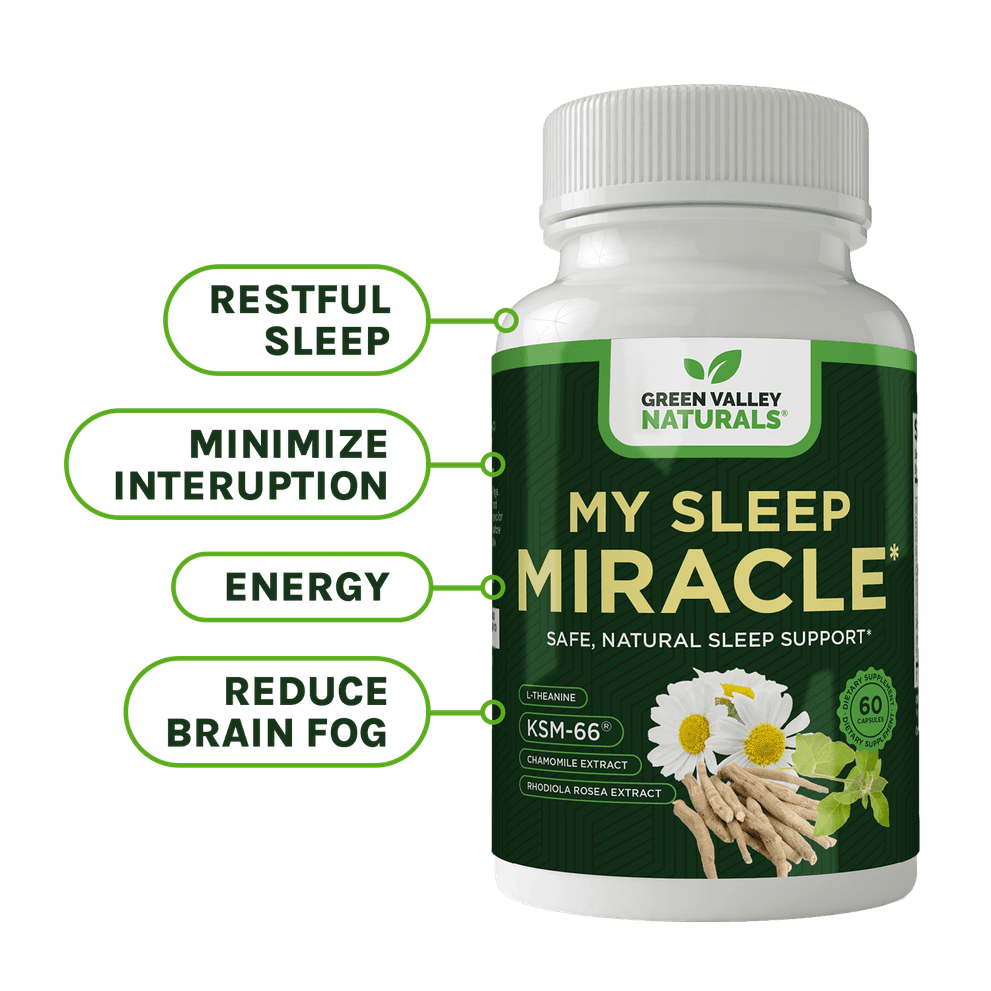
Is Melatonin Safe? Doctors Reveal Both the Benefits and Risks of Long-Term Use
If a tiny hormone your brain makes naturally suddenly becomes one of the most popular supplements in America… should we be curious—or concerned? Millions rely on melatonin to sleep, yet brand-new research reveals surprising risks that few people are talking about.
From unexpected heart health changes to quiet metabolic effects, doctors say melatonin may be far more complicated than the harmless “natural sleep aid” we assume it to be. Before you reach for that next gummy, here’s what you really need to know.
Key Takeaways
Melatonin helps with short-term sleep issues like jet lag and circadian rhythm disorders, but benefits are modest and dose-dependent.
Long-term use may be risky, with research showing increased heart-related complications and metabolic concerns, especially at higher doses.
Safer alternatives exist, especially botanicals and lifestyle strategies that support natural sleep cycles without hormonal disruption.
The Science Behind Melatonin
Melatonin is a hormone naturally produced by the pineal gland in the brain in response to darkness, playing a crucial role in regulating our sleep-wake cycles. As darkness falls, the pineal gland produces melatonin, causing levels to rise and signaling to our body that it’s time to rest. At dawn, production decreases, helping us wake up alert and ready for the day.
Most people produce enough melatonin for regular sleep needs, so supplementation is typically only necessary when natural production is insufficient.
Synthetic melatonin supplements aim to mimic this natural process, and research shows they can be genuinely helpful in specific contexts. Melatonin works both as a short-term sleep aid and as a chronobiotic that helps regulate the sleep-wake cycle over time. “Melatonin can modestly decrease the time it takes to fall asleep and improve overall sleep quality in individuals with insomnia, jet lag, or delayed sleep-phase disorder,” notes sleep research expert Dr. Marie-Pierre St-Onge, director of the Center of Excellence for Sleep & Circadian Research at Columbia University Irving Medical Center.
Studies confirm that melatonin supplementation increases total sleep duration and benefits people dealing with shift work disorder and various circadian rhythm disruptions. Melatonin is often used to treat circadian rhythm sleep disorders, such as delayed sleep phase syndrome and shift work disorder. It’s also shown promise for improving sleep in individuals with ADHD or autism, conditions where sleep disturbances are particularly common.
Melatonin Dosage and Timing
When it comes to using melatonin supplements as a sleep aid, both dosage and timing play a critical role in their effectiveness. Most adults are advised to start with a low dose—typically around 1 milligram—though recommended amounts can range from as little as 0.5 milligrams up to 5 milligrams, depending on individual needs and the specific sleep disorder being addressed. For example, those dealing with delayed sleep phase syndrome may benefit from taking melatonin earlier in the evening to help shift their sleep phase and align their sleep-wake cycle with their desired bedtime.
It’s important to remember that more isn’t always better; higher doses do not necessarily lead to better sleep and may increase the risk of side effects.
Timing is equally crucial: taking melatonin 30 to 60 minutes before your intended bedtime can help signal to your body that it’s time to wind down, supporting a smoother transition into sleep. However, the optimal timing may vary based on your unique circadian rhythm and the nature of your sleep issues. Children and older adults should be especially cautious, as their bodies may respond differently to melatonin, and professional guidance is recommended to determine the safest and most effective approach. As with any supplement, consulting a healthcare provider before starting melatonin—especially for chronic sleep disorders or in combination with other medications—is always the best course of action.
Beyond Sleep: Additional Benefits
The benefits of melatonin may extend beyond the bedroom.
Antioxidant Power
The supplement’s antioxidant properties have garnered scientific interest, with studies suggesting protective effects on brain health and cellular function.
Additional research points to melatonin’s possible role in reducing acid reflux symptoms and preventing certain types of headaches, including migraines. Evidence shows that melatonin may also benefit gut health and menstrual cycle regulation, though more research is needed to fully understand these effects.
Supports Cognition
Emerging research suggests that melatonin supplementation may offer cognitive benefits, particularly for older adults and those with neurodegenerative conditions such as Alzheimer’s disease. Studies indicate that melatonin, as a dietary supplement, can help improve aspects of cognitive function, including attention and memory, in these populations. The potential for melatonin to support brain health is linked to its antioxidant properties and its role in regulating sleep, both of which are important for maintaining cognitive performance.
However, the relationship between melatonin and cognition is complex and influenced by factors such as dosage, timing, and individual differences in melatonin levels. While some adults may experience cognitive improvements with melatonin supplementation, more research is needed to fully understand its effects and to determine the most effective protocols.
If you are considering melatonin to support cognitive health—especially in conjunction with other medications or supplements—it’s essential to consult a healthcare professional to ensure safe and appropriate use.
The Other Side of the Coin: Understanding the Risks
Despite these benefits, mounting evidence suggests that melatonin isn’t the harmless sleep aid many assume it to be, especially with prolonged use. Concerns about the long-term safety of melatonin are growing due to limited data on prolonged use. Recent research has raised significant concerns about long-term supplementation.
Heart Health Risks
A groundbreaking study just presented at the American Heart Association meeting examined five years of electronic health records from over 130,000 adults. The findings were striking: people who took melatonin regularly for at least a year were nearly twice as likely to develop heart failure compared to those who didn’t use the supplement. They were also more than three times as likely to be hospitalized for heart conditions and nearly twice as likely to die during the study period.
“Insomnia can increase blood pressure, stress hormones and inflammation,” explains Dr. Ekenedilichukwu Nnadi, lead author of the study and an internal medicine resident at SUNY Downstate/Kings County Primary Care in New York City. Importantly, researchers emphasize that melatonin itself may not be causing these heart problems. Instead, the need to take melatonin regularly could signal underlying health issues that require medical attention.
For individuals taking melatonin long-term, regular follow-up with a healthcare provider is essential to monitor for potential adverse effects and to ensure ongoing safety.
Metabolic Concerns
While some research indicates potential advantages for those with metabolic syndrome, including reductions in blood pressure and LDL cholesterol levels, other studies suggest that melatonin may negatively affect glucose tolerance and insulin sensitivity, particularly at higher doses and especially in men.
For individuals already at risk for metabolic conditions, this potential effect on blood sugar regulation is a significant consideration that shouldn’t be overlooked.
Short-Term Side Effects Matter Too
Even before considering long-term risks, melatonin users may experience a range of short-term side effects. Common complaints include vivid dreams or nightmares, feelings of depression or irritability, mild anxiety, and gastrointestinal issues like stomach cramps, diarrhea, or constipation. Some people report decreased appetite, daytime sleepiness, confusion, or mood swings.
More serious—though rare—effects can include changes in eyesight, dizziness, fainting, or decreased alertness. High doses or melatonin overdose can impact the central nervous system, leading to neurological symptoms such as confusion or impaired alertness. Older adults face particular risks, including increased likelihood of falls or confusion, which can have serious consequences for this vulnerable population.
Melatonin and Age
As we age, our bodies naturally produce less melatonin, which can contribute to sleep disturbances and make it more difficult to fall asleep and stay asleep. This decline in melatonin levels is a common reason why older adults often experience changes in their sleep-wake cycle and a decrease in overall sleep quality. Melatonin supplementation can help address these age-related sleep issues by supporting the body’s natural rhythms and improving sleep quality.
However, older adults should be mindful of the potential for increased sensitivity to the effects of melatonin, including side effects like daytime sleepiness and dizziness. Additionally, because many older adults take medications for conditions such as high blood pressure or depression, it’s important to consider possible interactions between melatonin and these drugs. Consulting with a healthcare provider can help ensure that melatonin supplementation is both safe and effective, taking into account the unique health needs and medication regimens of older adults.
Melatonin Interactions
Melatonin is generally considered safe for short-term use, but it can interact with a variety of medications and other supplements. For example, taking melatonin alongside blood thinners, diabetes medications, or sedatives can increase the risk of adverse effects such as bleeding, low blood sugar, or excessive sedation. Melatonin may also interact with other supplements like valerian root or St. John’s Wort, potentially amplifying side effects or altering the effectiveness of either product.
Special Considerations for Children
When considering melatonin use in children, parents should be particularly cautious. Melatonin supplements are often available in gummy form, which can be appealing to children but increases the risk of accidental overdose if not stored and dosed properly. Sometimes, healthcare providers may treat melatonin-related sleep issues in children, but this should only be done under medical supervision. Without professional guidance, melatonin supplementation in kids could potentially affect their development in ways we don’t fully understand. Melatonin may help children with sleep disorders not only with falling asleep but also with staying asleep, but the effects of long-term use on growing bodies and developing brains remain largely unknown, making medical supervision essential.
Natural Alternatives: Supporting Sleep Without Hormones
Given the emerging concerns about long-term melatonin use, many people are exploring natural alternatives that support the body's own sleep mechanisms rather than introducing synthetic hormones.
Choosing Better Sleep Hygiene
In today’s digital world, screen time before bed has become a major contributor to sleep disorders and trouble falling asleep. The blue light emitted by phones, tablets, and computers can suppress your body’s natural production of melatonin, leading to a delayed sleep phase and making it harder to wind down at night. This disruption of the sleep-wake cycle can result in sleep disturbances, reduced sleep quality, and difficulty maintaining a healthy sleep phase.
Evidence suggests that practicing good sleep hygiene—such as avoiding screens for at least an hour before bedtime—can help restore natural melatonin levels and promote better sleep. Additional strategies like using blue light filtering glasses or apps can further minimize the impact of screen time on your sleep. By combining these habits with mindful melatonin supplementation when needed, you can support your body’s natural rhythms, improve sleep quality, and reduce the risk of ongoing sleep issues. Prioritizing a relaxing bedtime routine and limiting screen exposure are simple yet powerful steps toward healthier sleep.
Natural Supplements to Promote Relaxation and Sleep
Unlike melatonin, which directly supplies a hormone your body already produces, natural sleep aids work by addressing the underlying causes of sleeplessness—stress, anxiety, and nervous system overactivation.
Consider these scientifically-backed botanical ingredients that work with your body's natural sleep mechanisms:
L-Theanine – Found in green tea, this amino acid promotes relaxation by increasing alpha brain wave production—the same brain waves associated with a calm, meditative state. Unlike sedatives, L-theanine induces relaxation without causing drowsiness, helping you naturally transition to sleep while also reducing stress and supporting healthy blood pressure levels.
Chamomile Extract (standardized to 1.2% Apigenin) – This time-honored herb promotes the release of GABA, a neurotransmitter that reduces over-excitement in the brain and facilitates relaxation. Chamomile has been used for centuries to ease stress, improve sleep quality, and even support digestive health—offering multiple pathways to better rest.
KSM-66® Organic Ashwagandha Extract – This highly concentrated adaptogenic herb helps lower cortisol levels, the stress hormone that often keeps people awake at night. Used for centuries in Ayurvedic medicine, ashwagandha supports not only better sleep quality but also memory, cognitive function, and immune health—addressing the root causes of sleeplessness rather than masking symptoms.
Rhodiola Rosea Extract (standardized to 3% rosavins, 1% salidrosides) – This powerful adaptogen enhances your body's resilience to stress by modulating the stress response throughout the day. Clinical studies confirm its ability to reduce fatigue, improve cognitive function, and promote a sense of calm and well-being—creating the ideal internal environment for natural, restorative sleep.
These ingredients work synergistically to address the underlying causes of poor sleep—stress, anxiety, and nervous system overactivation—rather than simply introducing synthetic hormones into your system. That's the philosophy behind Green Valley Naturals' My Sleep Miracle formula, which combines all four of these research-backed botanicals in therapeutic doses to support your body's own natural sleep-wake cycle.
Making Informed Decisions
So, where does this leave the millions of Americans who still want to rely on melatonin? The key is approaching supplementation thoughtfully and strategically.
First, consider whether melatonin is truly necessary. Many sleep issues can be addressed through improved sleep hygiene and natural alternatives—maintaining consistent sleep schedules, creating a dark and cool bedroom environment, limiting screen time before bed, managing stress, and taking supplements that support your natural sleep-wake cycle. These foundational practices often prove more effective than melatonin.
If you do choose to use melatonin, reserve it for short-term or occasional situations: jet lag, shift work adjustment, or temporary sleep disruptions. The modest benefits melatonin provides are generally considered safe when used this way. Remember: healthy adults may experience different effects from melatonin compared to children, older adults, or those with health conditions, due to differences in absorption and metabolism.
When evaluating sleep outcomes, pay attention to total sleep time, as it is a key measure of sleep quality that may be influenced by melatonin use.
For those who’ve been taking melatonin regularly for more than a year, experts strongly recommend consulting with a healthcare provider. “People should be aware that it should not be taken chronically without a proper indication,” emphasizes Dr. St-Onge.
This is particularly important for individuals with existing cardiovascular or metabolic conditions, who may face elevated risks from long-term supplementation. A conversation with your doctor can help determine whether your melatonin use is addressing the root cause of your sleep issues or potentially masking symptoms of more serious health problems that require different interventions.
Summary
Melatonin is a naturally occurring hormone that helps regulate the sleep–wake cycle, and short-term supplementation can be helpful for insomnia, jet lag, shift work, and circadian rhythm disorders. But new research signals potential concerns with long-term, habitual use. A major study involving over 130,000 adults found that people who used melatonin regularly for at least a year had higher rates of heart failure, cardiovascular hospitalization, and mortality—likely not because melatonin directly causes these issues, but because chronic sleep problems may reflect underlying health conditions. Melatonin can also cause short-term side effects, affect glucose tolerance, interact with medications, and pose risks for older adults and children. Because melatonin supplements aren’t well regulated, doses often vary dramatically. Experts recommend using melatonin sparingly, focusing on sleep hygiene first, and considering non-hormonal alternatives—like relaxation-supporting botanicals such as L-theanine, chamomile, and adaptogens—for safer long-term support.
Frequently Asked Questions
Is melatonin safe to take every night?
Short-term use is generally considered safe, but long-term nightly use may raise cardiovascular and metabolic risks. Experts recommend using it only when necessary and not as a chronic sleep aid.
What’s the safest melatonin dose for adults?
Most experts recommend starting with 0.5–1 mg, as higher doses don’t necessarily improve sleep and may increase side effects.
Can melatonin affect heart health?
A recent study of 130,000 adults found higher rates of heart failure and cardiovascular hospitalization among regular users. This may reflect underlying sleep or health issues rather than melatonin itself—but it warrants caution.
Is melatonin safe for children?
It can help children with specific sleep disorders, but long-term effects on growth and development are unknown. Use only under medical supervision.
What are safer alternatives to melatonin?
L-theanine, chamomile, ashwagandha, rhodiola, magnesium, sleep hygiene routines, light therapy, and limiting screens before bed can support natural sleep rhythms without hormonal disruption.

